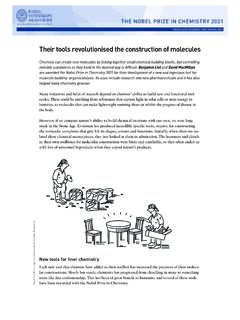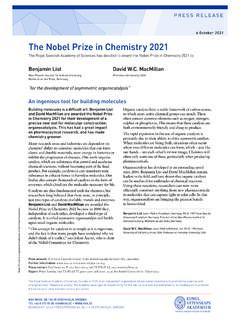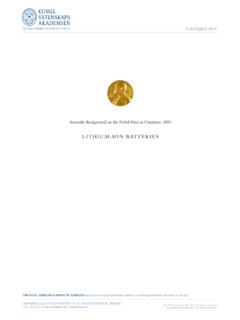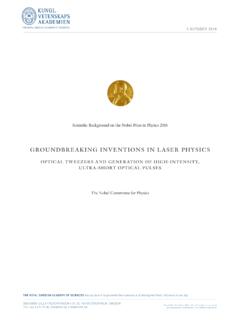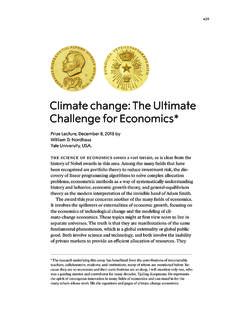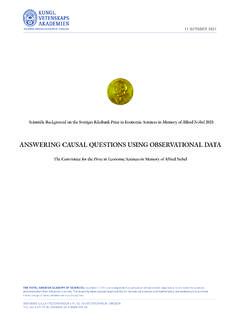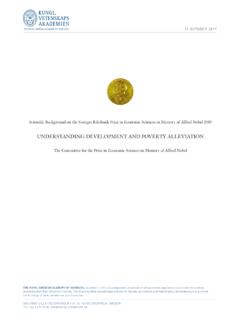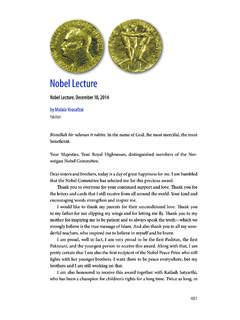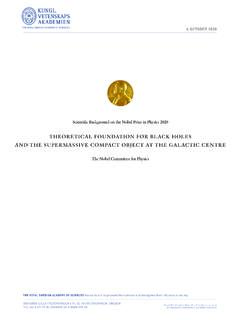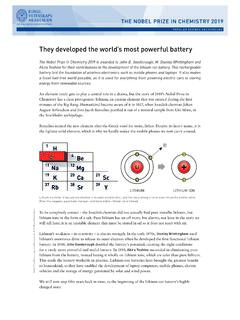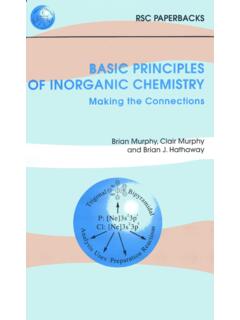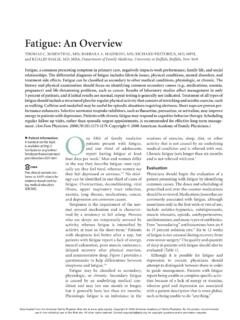Transcription of INFLATION AND UNEMPLOYMENT - Nobel Prize
1 INFLATION AND UNEMPLOYMENTN obel Memorial Lecture, December 13, 1976by MILTON FRIEDMANThe University of Chicago, Illinois, USAWhen the Bank of Sweden established the Prize for Economic Science inmemory of Alfred Nobel (1968), there doubtless was - as there doubtless stillremains - widespread skepticism among both scientists and the broader publicabout the appropriateness of treating economics as parallel to physics, chem- istry , and medicine. These are regarded as exact sciences in which objective,cumulative, definitive knowledge is possible. Economics, and its fellow socialsciences, are regarded more nearly as branches of philosophy than of scienceproperly defined, enmeshed with values at the outset because they deal withhuman behavior. Do not the social sciences, in which scholars are analyzingthe behavior of themselves and their fellow men, who are in turn observing andreacting to what the scholars say, require fundamentally different methods ofinvestigation than the physical and biological sciences?
2 Should they not bejudged by different criteria?1. SOCIAL AND NATURAL SCIENCESI have never myself accepted this view. I believe that it reflects a misunder-standing not so much of the character and possibilities of social science as ofthe character and possibilities of natural science. In both, there is no certain substantive knowledge; only tentative hypotheses that can never be proved ,but can only fail to be rejected, hypotheses in which we may have more or lessconfidence, depending on such features as the breadth of experience theyencompass relative to their own complexity and relative to alternative hypoth-eses,and the number of occasions on which they have escaped possiblerejection. In both social and natural sciences, the body of positive knowledgegrows by the failure of a tentative hypothesis to predict phenomena thehypothesis professes to explain;by the patching up of that hypothesis untilsomeone suggests a new hypothesis that more elegantly or simply embodiesthe troublesome phenomena, and so on ad infinitum.
3 In both, experiment issometimes possible, sometimes not (witness meteorology). In both, no experi-ment is ever completely controlled, and experience often offers evidence thatis the equivalent of controlled experiment. In both, there is no way to have aself-contained closed system or to avoid interaction between the observer andthe observed. The G del theorem in mathematics, the Heisenberg uncertaintyprinciple in physics, the self-fulfilling or self-defeating prophecy in the socialsciences all exemplify these course, the different sciences deal with different subject matter, havedifferent bodies of evidence to draw on (for example, introspection is a more268 Economic Sciences 1976important source of evidence for social than for natural sciences), find differenttechniques of analysis most useful, and have achieved differential success inpredicting the phenomena they are studying.
4 But such differences are as greatamong, say, physics, biology, medicine,and meteorology as between any ofthem and the difficult problem of separating value judgments from scientificjudgments is not unique to the social sciences. I well recall a dinner at aCambridge University college when I was sitting between a fellow economistand R. A. Fisher, the great mathematical statistician and geneticist. My felloweconomist told me about a student he had been tutoring on labor economics,who, in connection with an analysis of the effect of trade unions, remarked, Well surely, Mr. X (another economist of a different political persuasion)would not agree with that. My colleague regarded this experience as a terribleindictment of economics because it illustrated the impossibility of a value-freepositive economic science.
5 I turned to Sir Ronald and asked whether such anexperience was indeed unique to social science. His answer was an impassioned no ,and he proceeded to tell one story after another about how accuratelyhe could infer views in genetics from political of my great teachers, Wesley C. Mitchell, impressed on me the basicreason why scholars have every incentive to pursue a value-free science, what-ever their values and however strongly they may wish to spread and promotethem. In order to recommend a course of action to achieve an objective, wemust first know whether that course of action will in fact promote the scientific knowledge that enables us to predict the consequences of apossible course of action is clearly a prerequisite for the normative judgmentwhether that course of action is desirable.
6 The Road to Hell is paved withgood intentions, precisely because of the neglect of this rather obvious point is particularly important in economics. Many countries aroundthe world are today experiencing socially destructive INFLATION , abnormallyhigh UNEMPLOYMENT , misuse of economic resources, and, in some cases, thesuppression of human freedom not because evil men deliberately sought toachieve these results, nor because of differences in values among their citizens,but because of erroneous judgments about the consequences of governmentmeasures: errors that at least in principle are capable of being corrected bythe progress of positive economic than pursue these ideas in the abstract [I have discussed the method-ological issues more fully in (l)], I shall illustrate the positive scientific charac-ter of economics by discussing a particular economic issue that has been amajor concern of the economics profession throughout the postwar period;namely, the relation between INFLATION and UNEMPLOYMENT .
7 This issue is anadmirable illustration because it has been a controversial political issuethroughout the period, yet the drastic change that has occurred in acceptedprofessional views was produced primarily by the scientific response to ex-perience that contradicted a tentatively accepted hypothesis - precisely theclassical process for the revision of a scientific cannot give here an exhaustive survey of the work that has been done onM. Friedman269this issue or of the evidence that has led to the revision of the hypothesis. Ishall be able only to skim the surface in the hope of conveying the flavor ofthat work and that evidence and of indicating the major items requiring controversy about the relation between INFLATION and unem-ployment has been intertwined with controversy about the relative role ofmonetary, fiscal, and other factors in influencing aggregate demand.
8 One issuedeals with how a change in aggregate nominal demand, however produced,works itself out through changes in employment and price levels; the other,with the factors accounting for the changes in aggregate nominal two issues are closely related. The effects of a change in aggregatenominal demand on employment and price levels may not be independent ofthe source of the change, and conversely the effect of monetary, fiscal, or otherforces on aggregate nominal demand may depend on how employment andprice levels react. A full analysis will clearly have to treat the two issues there is a considerable measure of independence between them. To afirst approximation, the effects on employment and price levels may dependonly on the magnitude of the change in aggregate nominal demand, not on itssource.
9 On both issues, professional opinion today is very different than it wasjust after World War II because experience contradicted tentatively acceptedhypotheses. Either issue could therefore serve to illustrate my main have chosen to deal with only one in order to keep this lecture withinreasonable bounds. I have chosen to make that one the relation between infla-tion and UNEMPLOYMENT , because recent experience leaves me less satisfiedwith the adequacy of my earlier work on that issue than with the adequacyof my earlier work on the forces producing changes in aggregate STAGE 1: NEGATIVELY SLOPING PHILLIPS CURVEP rofessional analysis of the relation between INFLATION and UNEMPLOYMENT hasgone through two stages since the end of World War II and is now entering athird.
10 The first stage was the acceptance of a hypothesis associated with the270 Economic Sciences 1976name of A. W. Phillips that there is a stable negative relation between thelevel of UNEMPLOYMENT and the rate of change of wages - high levels of un-employment being accompanied by falling wages, low levels of unemploymentby rising wages (24). The wage change in turn was linked to price change byallowing for the secular increase in productivity and treating the excess ofprice over wage cost as given by a roughly constant mark-up 1 illustrates this hypothesis,where I have followed the standardpractice of relating UNEMPLOYMENT directly to price change, short-circuitingthe intermediate step through relation was widely interpreted as a causal relation that offered astable trade-off to policy makers.
